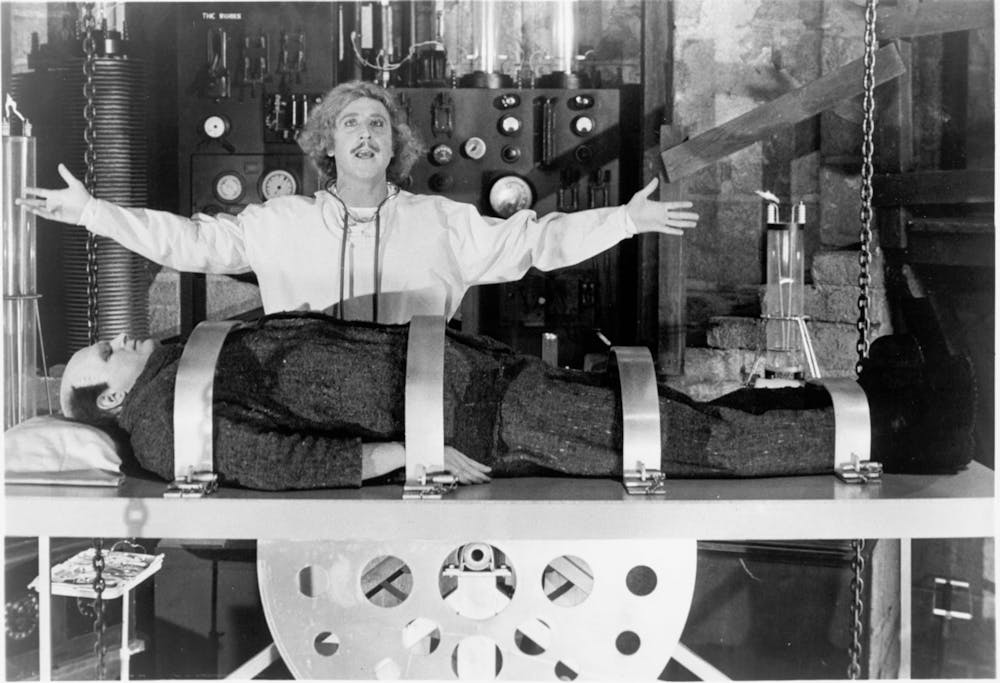A ghoulish castle drenches a hill in shadow. Lightning illuminates the cobweb ridden staircases of its interior. Outside, horses whine as werewolves howl throughout the thick forest of the town below. If this sounds like the introduction to a horror film, that couldn’t be more incorrect.
Director and writer Mel Brooks’ “Young Frankenstein” tells the story of Dr. Frederick Frankenstein, played by Gene Wilder, a stubborn neurosurgeon who inherits his grandfather’s castle before realizing his work in reanimation experiments might be possible to recreate. While narratively similar to “Frankenstein,” the original 1931 film adaptation of Mary Shelley’s novel, Brooks takes the spoof approach, effectively translating his token hilarity to the classic story about the man that created a monster. “Young Frankenstein” wasn’t just a riot when it was released in 1974, it still stands as one of the greatest comedies of all time.
The backbone of the entire project is Wilder. Best known for his role as the titular character in “Willy Wonka and the Chocolate Factory,” Wilder is utterly valiant, delivering the strongest performance of his career here. Not only are his hysterical outbursts of anger wonderfully wild, but he can immediately tone them down in favor of a more classy comedic pause. Most memorably, perhaps, the doctor reminds people to pronounce his last name “Fronkensteen”, an enjoyable bit, and a key indicator of his struggle with his destiny and familial legacy. Dr. Frankenstein is on the brink of insanity, and while it’s very entertaining to watch, it’s also somber as his drive to excel in science leads to the birth of a monster. He’s unsure what to do with his experiment, but it’s certain that he needs comfort as much as his monster does. Despite Frankenstein’s hard outer-shell, Wilder plays everything so sincerely that he’s hard not to adore.
Brooks’ approach to comedy is a far cry from the modern approach. While films like “Superbad” and “The Interview” are great, they rely on straightforward vulgarity, sex and drug jokes instead of genuine wit. Wit is Brooks’ bread and butter, allowing him to deliver the low-hanging jokes through a stacked supporting cast of characters. Whether it’s the lovable hunchback, Igor (Marty Feldman), the lab assistant, Inga (Teri Garr), the crazy castle caretaker, Frau Blücher (Cloris Leachman) or Frankenstein’s Monster (Peter Boyle), everyone gets time to shine. Comedy comes through their characters, and everyone contributes a unique delivery that melds into a harmonious whole. This is a gold standard for ensemble filmmaking.
While Brooks’ direction never steers fully into horror-comedy, he weaponizes horror tropes for the benefit of his humor. As much of the film is set in the same ghastly lab used in the 1931 film, Brooks plays up the atmosphere, beautifully capturing endless spider-webs, rain and rusted machinery through a classic black and white color scheme. Additionally, Brooks’ understands that telling a joke is similar to directing a scary scene; it’s all in the timing. Whenever rising orchestral music backs the mysterious secret passageways and foggy graveyards, the only thing hiding around the corner is another gag. Brooks’ direction makes fun of the audience for even being on edge. He’s here not to scare, only to show them a good time.
Ironically, the largest issue with “Young Frankenstein” is that it can get tiring. A great comedy should provide laughter throughout the entire runtime, but this film is front-loaded with its best gags. That’s not to say the third act is bad — it still provides a satisfying conclusion with a few more chuckles, though the climax does become plot-heavy in order to provide the proper resolution. Brooks understood the importance of cohesion and coherence in his storytelling, but he sacrificed the script’s spontaneity that was the standout aspect up until that point.
“Young Frankenstein” might start better than it ends, though that doesn’t diminish the incredible experience it delivers. It still holds up 50 years later, delivering a spectrum of humor most films wouldn’t go for today. That’s not because the jokes are dated or inappropriate, rather it’s Brooks’ standout cast that allows his script to leap off the page. Through zany wit and understated comedic timing, Brooks’ gem embodies the meaning of “comedy classic.”


